
Nottingham Writers' Club
Past Speakers
7th July - Stephen Booth
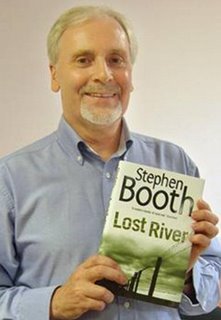
Stephen Booth had his first crime novel, 'Black Dog', published in 2000, but he had been writing in one form or another since early childhood-almost as soon as he could read - and frequently pestered family and friends to give him an inspiring sentence from which he would then write stories. As a teenager he wrote articles and stories for the school magazine, of which he eventually also became the editor.
Knowing that it was virtually impossible to leave school and immediately become a published writer, he went into a career in journalism, for which he says you need the ability to be an 'instant expert' in a wide range of subjects. He once worked on a farming magazine despite having absolutely no idea about anything to do with farming!
He explained that his work in journalism helped when he made the transition to writing fiction. For one thing, writing for newspapers teaches you about writing to deadlines and having your work edited and changed (qualities that editors and publishers are very keen on).
He has written a book every year since 2000, another thing that makes him popular with publishers. He was in his mid forties when the first book was written, and apparently this is something that publishers actually prefer - they like to know that their writers have experience and 'more than one book in them'.
Nevertheless, despite three publishers having a bidding war over his first novel, Stephen didn't give up the day job until after he completed his second. Until that time he was writing in the evenings while still working as a journalist. Ironically, now that he is a full time writer, he finds it takes him longer to write each book than when he was juggling writing and working - the first only took six months, now they usually take a year. He pointed out this was largely due to all the marketing and publicity work that a writer has to do these days, including a fair amount of online contact with readers.
Stephen had been a fan of crime fiction for many years, and for his first novel he wrote a book that he wanted to read. In much crime fiction, rural settings were often seen as quite 'cosy', while the city-based stories were far darker.
Stephen decided to set his in the Derbyshire countryside, but showed the dark, gritty side of rural life. Again, in deliberate contrast to all the world-weary, middle-aged detectives that populated other crime series at the time, Stephen chose to focus on two young junior officers as the main characters.
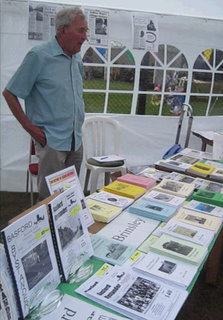
15th June - 1st July - Lowdham Book Festival 2010
The Nottingham Writers' Club again took part in the annual Lowdham Book Festival. Phil, our Treasurer, transported the display material to the event and set these out on our allocated tables. This year we were in a smaller marquee which we shared with another writing group. This proved to be a better position than last year. A number of NWC members attended to help run the stall.
As in previous years Club members had the opportunity to bring along their published work for sale and several members took advantage of this. Flyers giving information about the club were handed out to interested visitors.
Throughout the Saturday that we attended, there were a variety of events taking place and members manning the NWC stall, were able, by arrangement, to attend the talks or events of their choice.
Christine Smith
5th May - Roy Bainton on the subject of Inspiration
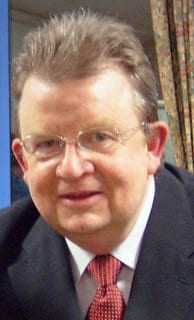
Roy Bainton is known to all Club members as our President, and he calls himself a jobbing writer, but did you also know he can act? He had everyone laughing as he recounted his experiences on a train travelling through Russian with the person he called 'Buddha Lady'. She looked the part and it was only later he realised she was actually the Border Lady.
This all goes to prove that inspiration can come from everywhere and at any time, and it's the writer's job to take those experiences and turn them into pages.
One of his earliest inspirations came from his time in the Merchant Navy which he joined in his teens. He remembers sailing into the sunset one evening and thinking it was as if he was sailing into heaven. So the idea for a story was born.
Everyone of us in unique so our lives and inspirations are unique. Some of his have come from unusual experiences, such as travelling on a train from Russia some years ago and having unexpected conversations with the border guards.
Or having a conversation with three men in a Bavarian drinking establishment who turns out to be old soldiers who'd served in the SS. All grist for the writing mill.
After writing many non-fiction books, Roy admits that he finds writing fiction difficult but the best thing he's found is that fiction is not hemmed in by facts and it can be as much of an adventure as you want to make it.
Inspiration can come from anywhere - the men in the pub, people you meet on a train, artefacts in a museum - any elements of your own existence. There's always a story to tell about families and their history - and we've all got those. It's how you tell it that's important, and humour is a very useful tool.
Roy has written many different things including sleeves for record covers and a quiz in a concert tour brochure and newsletter. One of these was a short history of Smokey Robinson of whom he's a big fan. He and his wife went to the concert and when he arrived he found out that Smokey wanted to talk to him.
Immediately fearing he'd made some mistake, he was led backstage. But the worrying was for nothing. Smokey just wanted to say he thought the text was great. Roy couldn't resist asking for his autograph.
He read a couple of poems from one of his books, Tiger Heart Velvet Paw. He'd always considered he couldn't write poetry but after being told by a friend, who'd helped him get work, 'you call yourself a jobbing writer to write,' he found he could and now writes them regularly. He says we could all write one a day if we put our minds to it. A good website if anyone wants to set themselves this kind of target is www.paragraphplanet.com.
3rd March - Alison Davies
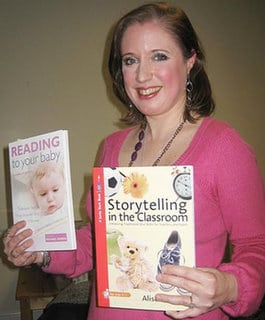
The title of Alison's talk was 'Techniques to Bring Language Alive and Stimulate Story Ideas', and this she certainly achieved via a route which was informative, thought provoking, and a lot of fun.
The evening began with Alison reminding us of her beginnings as a writer, emphasising how much she owed to the Nottingham Writers' Club, which she joined in 1996. She soon gained confidence, and her enthusiasm led to considerable success. Though she mainly wrote for children, Alison found that she also loved writing stories for adults, especially in the sci-fi and horror genres. She then progressed to working with children in schools. Noticing that many children lacked a background with books, she wrote 'Reading to your Baby', amongst other publications, and is currently working on picture books for young children.
The main part of the evening was then devoted to encouraging the audience to consider words and language in fresh ways. There were a few surprised faces when Alison gave out sheets of paper and told us we had to draw a picture - but she hastily explained that her special technique works with adults as well as with children!
So after Alison had given us an example of her own - drawing a picture of an incident which stood out in her memory - she asked us to do the same, as if we were seeing the scene like a film, not in words at that stage. We then moved into groups of three and described our picture to the other two, using three distinct kinds of words - but without 'telling the story'.
First, descriptive words; second, words about movement; and third, words about emotions. As Alison had predicted, it was more difficult that we thought to separate these words from the stories in our minds, but by trying to do so we had begun to see how important each aspect is to writing the actual story.
Finally, we swapped our pictures with those people outside our group who had not seen them before. (Much shuffling of papers and giggling - but the teacher was very patient!) We then had to imagine a title and story from the fresh picture, and write about it as if we were a critic in an art gallery. The results were interesting. Many were fairly accurate interpretations, but nobody could have guessed the most intriguing story: a picture by Ruth Wilson of a hut on which two flags were flying. It came from a journey she'd made when she left Wales as a child, during which she told her mother she had been there before. Her mother insisted she'd never been to England, but as their train went through a tunnel, Ruth described the hut with two flags which would be on the other side. And sure enough, it was there as she had predicted.
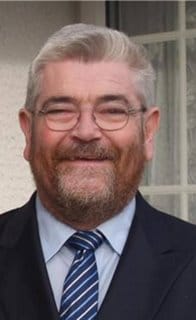
David Bowman on E Publishing
February Speaker's Meeting
E publishing is a new business, and like all new businesses, can be fraught with the unexpected, as David experienced when the company he was with went out of business. The main problem he faced was that, as he couldn't get out of the contracts he'd signed, he couldn't send his work elsewhere.
His solution was to set up his own with a partner who lives in New Zealand. But in the E World, distance is no problem.
E publishing is a very fast changing market place. Every year for the last ten years, the prophecy has been made 'within the next 12 months, e books will take over the world!' It hasn't happened, but their market share as steadily increased.
A new player has recently entered his market. Apple, who are intending to take over the downloading of e books in the same way as they did with music and their i player. They are looking to get a huge slice and want a bigger share of the profits than are being paid at the moment by companies like Amazon. The big five publishers in the USA are no longer satisfied with agreements they've signed and MacMillan, for a while, withdrew all their printed and e books from the Amazon website.
The main difference is that in the e book world, 'electronic' is king. All submissions are made electronically, editing is done electronically, covers are designed in the virtual world and the book is issued over a satellite link. David doesn't know of a single e publisher who accepts paper submissions.
The volume of sales is lower which seems depressing but, of all the books printed, only the top 3 per cent sell more than 100 copies. In 2007 the total e book market in the USA was around $70 million. The print book market for the same period was estimated at $35 billion.
So you won't get rich being e published, but you will have the satisfaction of being accepted, being 'in print' and being read.
The process is the same as for conventional publishers. Check out the website, find out how they want manuscripts submitting then follow those instructions carefully.
In the case of David's company, submissions are read and a decision to publish is based on two criteria.
Is it of publishable quality?
Is it marketable?
If he decides it is, the author will receive a contract. He advises authors to always go through these contracts carefully and check what you're signing. Most publishers will expect to have the publishing rights for two years. Never sign away your copyright.
The work is then edited, sometimes by two editors, and the work returned to the author. This is very much a two way process and takes between two and seven months.
The cover is then designed.
When everything is done, the e book is put on a number of retail sites as well as his own, sales are recorded through those sites and when money is received the author gets a percentage.
David foresees a bright future for the e book which can be downloaded to PC's, specific book readers such as Kimble or even mobile phones, although he doubts reading War and Peace on a mobile would be an uplifting experience!
For more information, please visit David's website, www.bluewoodpublishing.com.
Andy Smart of the Nottingham Evening Post
October 2009
Andy Smart is jointly responsible for its 'Bygones' magazine. The meeting was well attended by members and visitors.
Andy began with a couple of quotes about journalists and pointed out that different newspapers can report the same story giving an entirely different perspective. He continued by giving a light hearted review of his career spanning many decades and related how a local man invited him to see photographs of his father with Adolf Hitler. This was Andy's crowning achievement because the story, which he reported in 2007, became a world exclusive.
Andy then gave the audience a potted history of the Nottingham Post, which was the first newspaper in Nottingham and was launched in 1711. Over the next one hundred years many local newspapers sprang up, and in 1878 the Nottingham Evening Post was born. Today it is part of the Daily Mail Group.
In February 1997 a magazine, called 'Bygones', appeared on the shelves giving interesting and nostalgic tales of local peoples lives in Nottinghamshire. Topics that appeared frequently were tales of local floods supported by pictures.
Albert Ball, a local hero, was featured in 'Bygones' and Andy covered this 'boys own story' with a degree of fondness that reflected most peoples feelings who remember Albert. At the other end of the spectrum, 'Bygones' also featured the anti-hero Percy Toplis, who was the subject of a television programme in 1985 called, 'The Monocled Mutineer', written by Alan Bleasdale.
Andy informed members that Bygones is particularly interested in the changing face of Nottingham. One emotional topic is the demolishing of historical buildings and their replacement by modern architecture. The Empire Theatre, owned by the Moss Empire Group, closed in 1958 and was once graced by celebrities such as Charlie Chaplin, George Formby, Bruce Forsyth - and Laurel & Hardy, who were also frequent visitors. Another person who often appeared was a young Tommy Steele before he became a household name. The advent of television is thought to be responsible for the decline in popularity of many historical theatres and cinemas which, once demolished, are replaced by multiplex cinemas devoid of any character.
After the break, Andy was open to questions from the audience, which allowed them to comment on their own experiences and memories. Bygones is printed on the first weekend of every month and each month has a set subject. The topics are planned twelve months in advance, but the magazine also appeals for readers to submit letters and articles. When launched in 1997, 'Bygones' cost fifty pence, and it has only risen to sixty five pence in eleven years.
If members wish to submit a suitable story, letter, or poem, contact Andy at Bygones, Nottingham Evening Post. The magazine has a monthly circulation of 10,000 copies but is read by as many as 50,000 people. Every story has been stored on computer since 1997 and the magazine can be seen online.
The audience felt it had been a very interesting and enjoyable evening.
Mel Grant
Bead Roberts on Writing Stories for Competitions
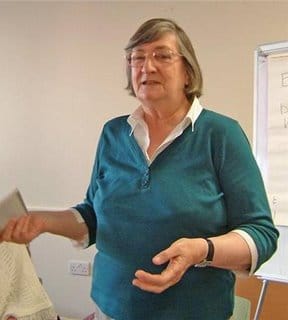
Bead is a very successful short story writer - among her many writing talents - and her talk centred around writing for competitions. Much of what applies to prose competitions can also apply to poetry.
The two most important things to remember are to obey the rules, and write to the word count.
As many competitions cost several pounds to enter, Bead revealed how she had started out, by building up a fund from readers letters that paid; this also taught her to write 'tight', so at the end of that first year she had her entry fee money and a valuable writing skill.
The pros and cons of entering competitions:
Use your own voice - how you want to write. You are not conforming to a
'target' market.
You can sell the stories later.
It opens doors, gets your name recognised.
Swear words can be used.
Beware one man competitions as they may not be as beneficial as other better
known ones.
Reasons for refusal:
Poor spelling, punctuation and grammar
Poor quality print
A play or article instead of a short story
Word count exceeded
Unintelligible, identifying marks and single spacing.
All these could be avoided by reading the competition rules and following them.
A few useful points to also consider:
Don't go with your first idea - so will everyone else. Make the theme work for
you.
If it doesn't sound right, it probably isn't.
Try recording the story or read aloud.
Don't have everyone speaking grammatically correct and be careful when using
dialect - it can slow the reader down if they are reading phonetic spelling.
Always check the correct spellings for sound alike words - sole/soul,
their/there.
Names come with baggage. They must do a job, suit the character.
NEVER send the same story to another competition at the same time.
Keep a record of where you have sent stories.
Get entries in early - try for at least a month before the deadline - it gives
time for your entry to be read properly; rather than among a lot in the last week.
Eamonn Riley, Childrens' Author
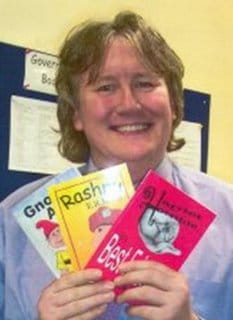
'My mission - to enrich children's lives by actively involving them in the process of story telling and creative writing. My mission is to inspire the children so that they discover for themselves their own latent creativity.'
Eamonn Riley left school with 1 GSCE and worked in supermarkets and factories, but after years of studying at night school now has O Levels, A Levels and 4 degrees. Having finished them he was left with a feeling of 'what shall I do now?' The 'what' turned out to be children's stories. To date, he has written 8 and has another on the way, and Eamonn has his own special way of marketing and selling.
As a former teacher, he's used to talking to children, lots of them, in small and large groups, so his selling plan is to go to schools, talk to the children at assemblies about reading and creative writing, and read to them. He then leaves a box of books at the schools for the school and individuals to buy. It's a technique that's working well and he's now sold more than a quarter million in six years.
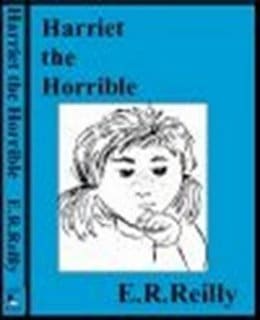
He writes for two age groups - 5 to 7 and 8 to 11 - and the books are published in India. His stories have a moral theme but he doesn't want to preach to children. Instead he lets them know that children in his stories sometimes have similar lives to them but also that some are a lot less fortunate.
Children's books follow fashions the same as everything else. For example, a few years ago it was very un-PC to write anything about the supernatural but thankfully Harry Potter changed all that. Perhaps back then a book called Harriet the Horrible wouldn't have got past the school gates, but I'm sure thousands of children are glad that it did.
Details of all his books can be found on www.er-reilly.co.uk
Liz Jones - Freelance Journalist
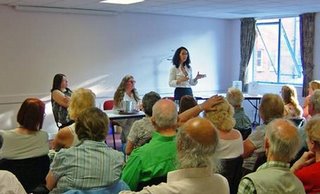
Liz Jones is an author and well-known journalist on The Daily Mail and Mail on Sunday who said 'I spill my guts for money'. Anyone who is a reader of Liz's column in the Mail on Sunday knows that this is true, and she spoke of some of her work detailing her life when she met her man, married him, lived with him and then divorced him.
An interest in information led her into journalism but now the job has changed. Back then new reporters were nurtured by their editors, and taught their craft. Now it's armchair reporting, many using web based information instead of going out and finding out for themselves. There is much more emphasis on printing stories that help sell the paper or magazine on behalf of its advertisers.
Gossip certainly sells but there is a need to return to great writing. Fashion images in magazine are not about the clothes but about selling the fantasy and when writing about it she did what the magazine told her to do. In her experience, women want to change themselves. Men want to buy things, and ads and articles cater to this.

Liz is no stranger to controversy and has been sued on a number of occasions for telling the truth. The latest is Kate Winslett who, like so many celebrities, like to read only good things about themselves. She said this is unfair as it gives an erroneous example to people who then feel inadequate when comparing themselves to people they admire.
Of her column writing for the Mail on Sunday she says she 'mines the detritus of life and puts it on a page'. Liz writes frankly about her life, particularly about the men in it, and has found that it makes people back away from her as they fear she will write about them.
In the fashion world, she is known as the editor who reads a book during catwalk shows. Liz explained that she spends a lot of time in the audience waiting for something to happen, so why not?
After the break Liz answered questions.
Liz now lives on Exmoor rescuing animals and asked for her fee to be donated to that cause.
Lowdham Book Festival 2009
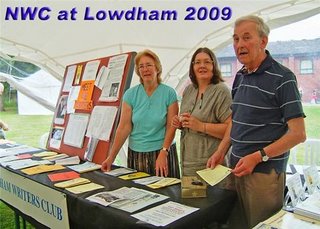
Nottingham Writers' Club again took part in the annual festival. Phil, our Treasurer, transported the display material to the event and set these out on our allocated tables in the large marquee. Committee and members came along to man the stall and, as in previous years, Club members had the opportunity to bring along their published work for sale and several members took advantage of this. Flyers giving information about the club were handed out to interested members of the public and our display material provided a number of talking points.
Throughout the Saturday, there were a variety of events taking place and members manning the NWC stall, were able, by arrangement, to attend the talks or events of their choice.
Of particular interest were "Castles of Nottinghamshire"; "Grandmother Gell's Kitchen" and "If in doubt - bring in a man with a gun or How to write and perform a play." Other items included "Destinations" with Derrick Buttress; a presentation by Nicola Monaghan and a talk on Derbyshire coal miners by former NWC Club member David Bell. All proved immensely popular and it was often "standing room only".
After browsing the second-hand book stalls it was time to pack up and tidy. We'd had a good day and the weather was kind to us. Hopefully we shall to participate in next year's Lowdham Book Festival.
Mike Wilson - writer and singer
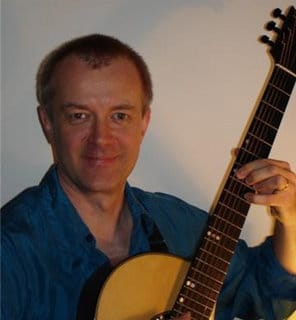
Although Mike's presentation might best be described as a performance, rather than a lecture, he is a writer and musician who has written more than eighty books for 'reluctant reader-teenagers and beginner-readers'. His musical credits include a one-man show about Jake Thackray's songs and a theatre piece about the lives of Brecht, Weill and Eisler.
Mike talked of his admiration for singer/song-writer Jake and entertained us with superb renditions of a selection of his songs.
Jake was part of the same sixties folk circuit as Billy Connelly and Jasper Carrott. Sadly Jake died aged sixty-two, leaving one to wonder what gems he might have created had he survived to the present day.
Mike's unashamed aim was to convince his audience that Jake, who initially earned his living as a teacher, was not simply a contemporary folk song composer, but a real poet, up there with the best of them as we listened to Jake's genuine poetic ability. We listened to sad songs, peculiar songs, love songs and, oh yes, dirty songs. All were well-crafted, unusual and interesting pieces of poetry set to music. Jake used the same tools employed by so called 'proper poets' - assonance, resonance, alliteration, extended metaphor, internal rhyme and simile.
His songs were also very much short stories, tales or ballads with a mythical, timeless quality. His subjects ranged across the canon of human experience, offering an often whimsical or surreal impression of the world. One subject which kept coming up was his views on women which were not entirely complimentary to the fairer sex. One imagines that some of this was perhaps tongue-in-cheek humour, especially the one about a woman who never stopped talking. Even in the course of love-making, she just went 'on and on and on an on'.
To prove his point about Jake's poetic ability, Mike read a poem which he had cobbled together using lines by several well-known poets and also included material by Jake. He asked us if we could identify which lines belonged to which poet and if we could spots the ones written by Jake. Needless to say, not one member of the audience did. With this in mind, I have reproduced the poem at the bottom of the page and I would like readers to try and attribute the right lines to the poets. Answers please via e-mail or post by the November manuscript evening. The first correct entry drawn out of the hat at the Christmas social will receive a £10 book token.
This was the second time Mike had visited the club. Last year he talked about the role of rhyme in poetry and had brought along copies of his recently published first collection of poems entitled 'Desperanto'. We wish him well with this book.
Nicola Monaghan, Nottingham Novelist
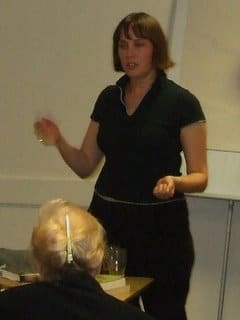
The two things that struck me most within five minutes of Nicola's talk to the club on Wednesday was first, how young she was to be so successful and secondly her abundant enthusiasm. She spoke, without notes, about her life so far and her novels, "The Killing Jar", published in 2006 to critical acclaim and "Starfishing" in 2008. The former is of particular interest to the Club as it is set on the Broxtowe Estate of Nottingham, one of the many areas of the city where Nicola lived as a child.
She was the first person in her family to attend University where she qualified as a maths teacher, but after three years in teaching decided to spread her wings and went on to various exciting ventures, in different fields, that took her to the City of London, Paris, Chicago and New York, where she narrowly missed the events of 9/11 as her offices had been based in the first of the Twin Towers.
Returning to the safety of Nottingham, Nicola enrolled at the Trent University and took an MA course in creative writing; this was nothing new to her as she had loved reading and writing since primary school days. She gave us all a useful insight to this comparatively new degree.
Having graduated in 2004 with distinction Nicola began her writing career. Apart from the novels and a novella entitled "The Okinawa Dragon", she has had numerous stories, articles and poems published and is working on several assignments all the time. She is a founder member of the Nottingham Writers' Studio and has also worked at Birmingham City University where, until recently, she was a Fellow of the National Academy of Writing.
Many questions were forthcoming after the break and Glenis Wilson gave the vote of thanks. Make no mistake. Nicola Monaghan will be a name to remember and one who will join the elite band of Nottingham's established writers.
: email: :

|
|
Site Menu: Home | About Us | Audio Recordings Info | Audio Recordings | Bios | Competitions | Contact Us | FAQ | Gallery | History | Membership | Members Sucesses | News | Programme | Round up of Past Events | Speakers | Workshops | Privacy & Cookie Policy |
|
